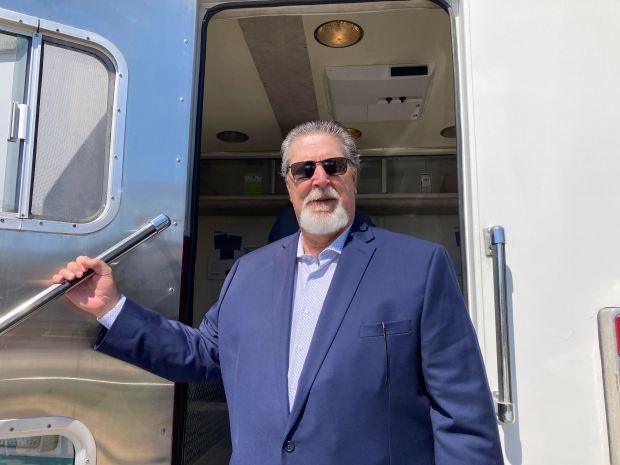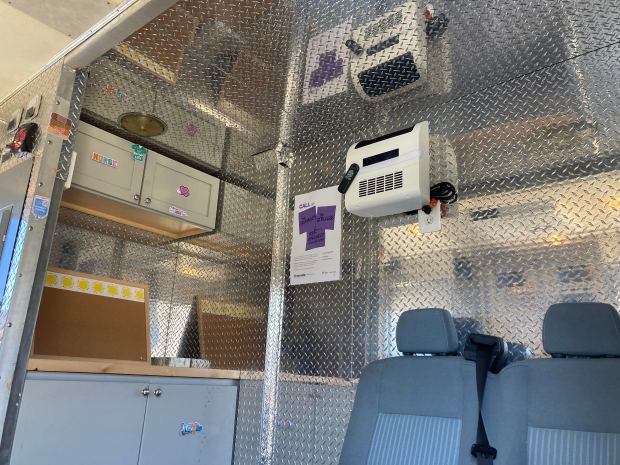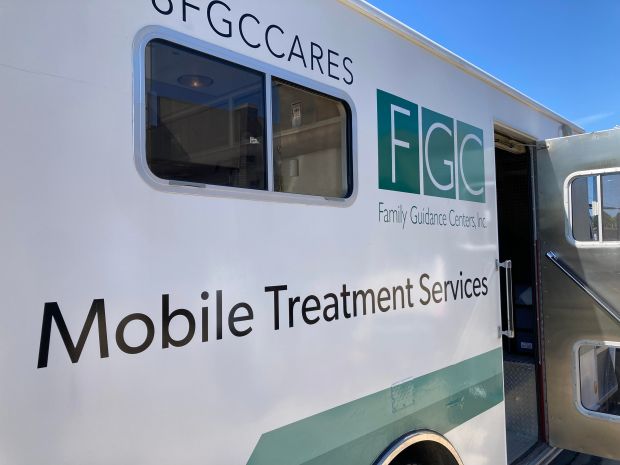Family Guidance Centers offers medications to people meant to counteract the effects of opioid overdoses from a clinic.
But whether it’s access to transportation, child care needs or physical limitations, the nonprofit knows there are many people who need the lifesaving drugs but can’t get to the clinic, said Ron Vlasaty, Family Guidance Centers’ chief operating officer.
With the help of a Cook County grant of nearly $1 million, Vlasaty and county officials celebrated the rollout of a van that will bring the medications to more than two dozen south suburbs.
The program was announced Friday during a news conference outside the Posen Fire Department’s headquarters, with the new van and another already in use by Family Guidance Centers parked outside.
Cook County Board President Toni Preckwinkle said while opioid overdose fatalities are “trending in the right direction,” the problem is still of major concern.
“This crisis is everywhere,” Preckwinkle said. “This is a challenge we have all over the country, not just in Cook County.”
With the rollout of the van, a refurbished ambulance, residents will no longer need to overcome transportation or access issues, she said.
We are “able to deliver the care and services right where they are,” Preckwinkle said.
The van is equipped with a nurse, peer recovery support specialist and outreach staff to deliver care directly to communities most affected by the opioid crisis, according to the county.
It carries methadone, buprenorphine and naltrexone, FDA-approved medications for opioid and other drug overdoses. Family Guidance Centers’ other van delivers naloxone, also known as Narcan, which can revive a person suffering an opioid overdose, Vlasaty said.
Posen police Chief William Alexander said opioid overdoses are one of the most urgent challenges faced by first responders.
“We are losing far too many lives to addiction and senseless violence,” Alexander said.
Preckwinkle said, with the rollout of the van, health care officials are working to operate in a backdrop of possible federal spending cuts that would help their efforts.
The nearly $1 million grant to Family Guidance Centers comes from the county’s allocation of federal American Rescue Plan Act, a $1.9 trillion economic stimulus package passed in response to the COVID-19 pandemic.
A van operated by Family Guidance Centers will provide opioid overdose medications to the south suburbs with help from a Cook County grant of nearly $1 million. (Mike Nolan/Daily Southtown)
“We see at the federal level a discouraging and alarming willingness to cut health care services,” Preckwinkle said, vowing Cook County will continue to provide services to those in need.
“If someone needs help we want to make sure they get it,” she said.
Deborah Sims, former Cook County commissioner for the 5th District, which includes many south suburbs, said “this is a good day.”
Sims said that in delivering health care, agencies “always want people to come to us.”
“If we can take it to the community it’s always better for us and better for the residents,” she said.
The grant program is part of the county’s Stronger Together initiative, a countywide effort focused on behavioral health equity, system coordination and the expansion of community-based care, according to the county.
The county grant to Family Guidance Centers is spread over three years, and the mobile unit will operate Monday through Friday.
Tom Nutter, chief behavioral health officer with the Cook County Office of Behavioral Health, said opioid addiction affects people from the very start, creating a dependency that requires increasing amounts of drugs.
For those with addictions, Nutter said their day “begins with how will I get the drug and how will I pay for it?”
Nutter praised Family Guidance Centers for its work, saying they bring “unquestionable dedication” to the job.
The Cook County Office of Behavioral Health was established by the county in 2023 to address the behavioral health needs of county residents, particularly those from historically marginalized and underserved populations.
Vlasaty said that the Family Guidance Centers operates 14 locations in Illinois, including eight in Cook County.

He said the Harvey clinic takes in residents from many south suburbs, but people can’t always get to that location.
Vlasaty said the van will be able to go to patients’ homes or central locations, such as village halls and police and fire stations, to distribute medications.

He said the nonprofit already distributes naloxone, which can help revive someone suffering an opioid overdose, to south suburban police departments through a smaller van it purchased with help of a previous county grant.
Family Guidance Centers also has a naloxone distribution point at Harvey’s Pace bus station, established about a year ago. He said it needs to be refilled every couple of days and was done in conjunction with the county and Pace.
Vlasaty said Family Guidance Centers will put up informational posters at municipal buildings, liquor stores, gas stations and food pantries “and wherever people congregate” to publicize the new mobile unit.
“We need to get the word out to where people are at to let them know this is available,” he said.





